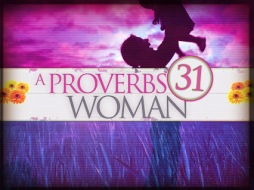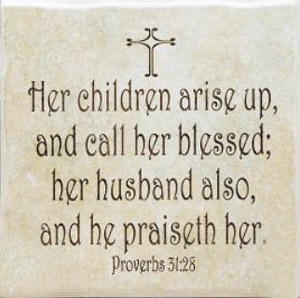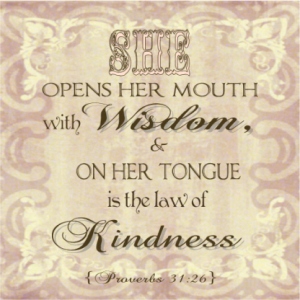 Bathsheba was not only King David’s forbidden lover. She was also King Solomon’s mother. And St. Gregory of Nazianzus identifies King Solomon as the one who wrote down Proverbs 31:
Bathsheba was not only King David’s forbidden lover. She was also King Solomon’s mother. And St. Gregory of Nazianzus identifies King Solomon as the one who wrote down Proverbs 31:
The divinely inspired Solomon in his instructive wisdom, I mean in his Proverbs, praises the woman who keeps her house and loves her husband. . . . he praises her who is engaged honorably at home, who performs her womanly duties with fearless courage, her hands constantly holding the spindle as she prepares double cloaks for her husband, who buys a field in season, and carefully provides food for her servants, and receives her friends at a bountiful table, and who exhibits all other qualities for which he extols in song the modest and industrious woman.
(Gregory of Nazianzus, On His Sister St. Georgina, Oration 8.9)
While he was usually called “Solomon”, he actually had multiple names. King David called him “Jedidiah” (2 Samuel 12:25), and in Proverbs 31 he is called “King Lemuel”. But these are all just different names for the same man.
The first verse of Proverbs 31 says this chapter is “the prophecy that his mother taught him.” Thus, Bathsheba is the author of Proverbs 31, and her son–the king–is simply the scribe.
What are the implications of Bathsheba being the author of Proverbs 31?
There are several things we can learn from this:
- Proverbs 31 is realistic for women
- Proverbs 31 highlights a godly mother/son relationship
- Proverbs 31 demonstrates how women can influence the world
- Proverbs 31 illustrates the reality of redemption
We can look at each of these points in turn.
Proverbs 31 is realistic for women
Proverbs 31 was written by a woman. It is not the fantasy of some clueless man. Bathsheba taught her son what godly womanhood looks like, and Solomon took her message to heart. If she had been a hypocrite, it would seem unlikely that her son would be so careful to preserve her teachings on this subject. This suggests that Bathsheba not only wrote Proverbs 31, she also lived it. She set a good example, and she practiced what she preached. It is realistic for a woman to live according to the example set in this passage of Scripture.
Proverbs 31 highlights a godly mother/son relationship
King David had many sons, but none so great as King Solomon. While his brothers Absalom and Adonijah plotted treason and murder, Solomon was a faithful son. Scripture reveals that a significant part of the difference had to do with parenting. And in this case, it was not due to the parenting of the father . . . it was due to the parenting of the mother.
Unfortunately, Scripture is not flattering in regard to David’s aptitude as a godly father. According to 1 Kings 1:6, David never disciplined Adonijah, or asked him “what are you doing?” He may have been a man after God’s own heart, but in this case, he was a failure as a father.
Absalom, Adonijah, and Solomon all had the same father, King David. But they had different mothers. Haggith was the mother of Absalom and Adonijah, and Bathsheba was the mother of Solomon. Adonijah and his brother Absalom may never have received sound teaching or guidance from their parents, but Solomon certainly did. In Proverbs 31, Solomon describes in detail what a godly household is supposed to look like. And he credits this teaching to his mother.
 Of course, all three children would have been better off if David had stepped up to the plate, and been a godly father. But since he didn’t, the godly motherhood of Bathsheba made all the difference in the world. She diligently taught her son, and made such an impression on him that he never forgot her instruction.
Of course, all three children would have been better off if David had stepped up to the plate, and been a godly father. But since he didn’t, the godly motherhood of Bathsheba made all the difference in the world. She diligently taught her son, and made such an impression on him that he never forgot her instruction.
In Israel and Judah, the mothers of kings were not always treated with such honor. Scripture says that Asa was a good king, and he removed his own mother from being queen, because she was guilty of idolatry (1 Kings 15:13, 2 Chronicles 15:16). Thus, when King Solomon treats his mother with such high esteem, it is a testament to the godliness of his mother. She was a good woman who taught her son to follow the path of righteousness.
Elsewhere in Scripture, King Solomon shows just how much he honors his mother:
Bathsheba therefore went to King Solomon, to speak to him for Adonijah. And the king rose up to meet her and bowed down to her, and sat down on his throne and had a throne set for the king’s mother; so she sat at his right hand. Then she said, “I desire one small petition of you; do not refuse me.”
(1 Kings 2:19-20)
King Solomon is the most powerful man in the nation. Yet he still bows down before his mother, to show her honor and respect. Then he proceeds to set a throne beside his own, and to have her sit at his right hand. And since King Solomon is a picture of Christ, his queen mother — Bathsheba — is a picture of the Blessed Virgin Mary. This scene is reminiscent of Psalm 45:9, the Messianic Psalm which says, “upon thy right hand did stand the queen” . . . a passage which numerous Early Church Fathers have identified with the Theotokos herself. King Solomon’s actions are in accord with Proverbs 31:28, which says that the children of a virtuous woman will “rise up and call her blessed.”
Proverbs 31 demonstrates how women can influence the world
According to Proverbs 31:26, a godly woman “opens her mouth with wisdom; and in her tongue is the law of kindness.”
 Bathsheba taught her son what a godly woman looks like. She set the example. Through her life, and through her direct teaching, she taught her son how to identify a godly wife and mother. Even after he becomes an adult–even after he becomes king–he does not forget his mother’s teaching. Instead, he passes it on. Through the pen of her son, Bathsheba’s teachings are given to the kingdom, and ultimately to the entire world.
Bathsheba taught her son what a godly woman looks like. She set the example. Through her life, and through her direct teaching, she taught her son how to identify a godly wife and mother. Even after he becomes an adult–even after he becomes king–he does not forget his mother’s teaching. Instead, he passes it on. Through the pen of her son, Bathsheba’s teachings are given to the kingdom, and ultimately to the entire world.
Not every woman is gifted with the ability to write books, or to speak publicly. Yet that does not mean she is left without a voice. If she is diligent to teach her children well, she eventually wakes up to find that her children have become adult men and women who carry on her message.
In this case, Solomon is the most powerful man in the nation. He is the king. Yet he continues to be guided by the teaching of his mother. As the old saying goes, “The hand that rocks the cradle rules the world.”
Proverbs 31 illustrates the reality of redemption
We remember St. Paul for being an apostle, and for writing most of the New Testament.
We do not merely remember his former days of murder, and persecution of the Church.
We remember King David for being a man after God’s own heart.
We do not merely remember his former adultery and murder.
We should remember Bathsheba for being the Proverbs 31 woman.
We should not merely remember her affair with King David.
Christianity is not a story about people who live flawless lives, and breeze their way into heaven, having never been scarred by sin.
Christianity is a story about vile sinners who repent, and who are redeemed. Jesus confronts a murderer on the road to Damascus, and changes him into an apostle. Jesus confronts an adulterous woman, and tells her to “Go, and sin no more.”
 Bathsheba is one such woman. When we first meet her, she is disgraced and shamed because of her adulterous encounter with King David. Yet she repents, and is faithful to God. She is an excellent mother, and she diligently teaches her son the path of wisdom and righteousness. Because of her teaching, Solomon becomes David’s most excellent son, far surpassing his brothers Absalom and Adonijah. Through the pen of her son, Bathsheba becomes the author of a passage of Holy Scripture. And it is not just any chapter . . . it is the chapter of Scripture which best describes what it means to be a woman of virtue.
Bathsheba is one such woman. When we first meet her, she is disgraced and shamed because of her adulterous encounter with King David. Yet she repents, and is faithful to God. She is an excellent mother, and she diligently teaches her son the path of wisdom and righteousness. Because of her teaching, Solomon becomes David’s most excellent son, far surpassing his brothers Absalom and Adonijah. Through the pen of her son, Bathsheba becomes the author of a passage of Holy Scripture. And it is not just any chapter . . . it is the chapter of Scripture which best describes what it means to be a woman of virtue.
God took Bathsheba, and made her into the Proverbs 31 woman.
This is a story of redemption, and it can encourage us all. If you are a woman — no matter what may be in your past — it is possible for you to follow in the footsteps of righteous Bathsheba, and become a Proverbs 31 woman yourself.

This is so good!! It really does change things when we realize that Bathsheba wrote Proverbs 31! Somehow when we look at Bathsheba it does make this passage more “doable”. The amazing thing is that because of Jesus, we start out as Proverbs 31 women, and simply grow along the way. Great historical contextual post!
Now I wish I could find an icon of, Bathsheba. I had always struggled with the Prob. 31 woman. Now I love her.
A million thanks for the insight.
Most of the time when one mention the name of Bathsheba we think of a woman that had committed an affair. However God,s love can penetrate a person heart and therefore Bathsheba had change. Because of her repentance she was able to raise her son Solomon in a Godly manner. Most readers think this chapter is a metaphor but this is Bathsheba in action
I love this. The Proverbs 31 woman has always been my hero. She is a working woman, and wise in financial affairs and business, as well as taking care of her family. It is even more important to me to learn that the Proverbs 31 woman was Bathsheeba. It assures me of the redeeming and sanctifying power of the Lord that can transform and change an individual, from a sinner to one who is highly praised as the virtuous woman.